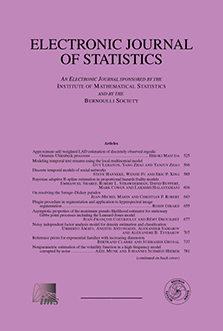Abstract
The problem of univariate mean change point detection and localization based on a sequence of $n$ independent observations with piecewise constant means has been intensively studied for more than half century, and serves as a blueprint for change point problems in more complex settings. We provide a complete characterization of this classical problem in a general framework in which the upper bound $\sigma ^{2}$ on the noise variance, the minimal spacing $\Delta $ between two consecutive change points and the minimal magnitude $\kappa $ of the changes, are allowed to vary with $n$. We first show that consistent localization of the change points is impossible in the low signal-to-noise ratio regime $\frac{\kappa \sqrt{\Delta }}{\sigma }\preceq \sqrt{\log (n)}$. In contrast, when $\frac{\kappa \sqrt{\Delta }}{\sigma }$ diverges with $n$ at the rate of at least $\sqrt{\log (n)}$, we demonstrate that two computationally-efficient change point estimators, one based on the solution to an $\ell _{0}$-penalized least squares problem and the other on the popular wild binary segmentation algorithm, are both consistent and achieve a localization rate of the order $\frac{\sigma ^{2}}{\kappa ^{2}}\log (n)$. We further show that such rate is minimax optimal, up to a $\log (n)$ term.
Citation
Daren Wang. Yi Yu. Alessandro Rinaldo. "Univariate mean change point detection: Penalization, CUSUM and optimality." Electron. J. Statist. 14 (1) 1917 - 1961, 2020. https://doi.org/10.1214/20-EJS1710





